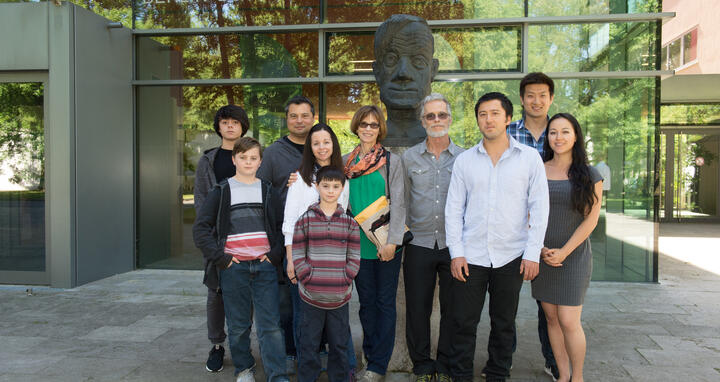Committed to Max Delbrück’s scientific legacy
Lina und Jonathan Delbrück observing zebrafish under a microscope at the MDC. Photo: Svea Pietschmann / MDC
He was the father of molecular biology. The Max Delbrück Center for Molecular Medicine (MDC), which was established 25 years ago and has now become one of the most distinguished institutions of its kind in the world, bears his name. Born in Berlin, the physicist and Nobel laureate Max Delbrück (1906-1981) lived in the capital until 1938, experiencing the emergence of particle physics and completing his first important studies on the molecular foundations of genetics. A research fellowship in the late 1930s took him to the United States where he conducted his groundbreaking work demonstrating the molecular existence of genes.
What has happened in more than 80 years of research in molecular biology? Max Delbrück himself always campaigned for open, interdisciplinary research. How do his ideas continue to shape activities on the research campus of his native city?
On 2 June 2017, members of Max Delbrück’s family from the United States visited the MDC: his son and daughter Jonathan Delbrück and Nicola Salmon accompanied by eight of their children and grandchildren. During the tour of the Berlin-Buch Campus and visits to the laboratories they were given an insight into modern molecular biology: from zebrafish embryos whose genetically modified hearts beat under the microscope to the extraordinary rodent, the naked mole-rat, which is genetically protected against low blood sugar and lack of oxygen.
After the war, Max Delbrück supported the development of molecular biology in Germany
In discussions with the founding director of the MDC, Professor Detlev Ganten, and the current scientific director, Professor Martin Lohse, as well as other scientists and surviving contemporaries many memories of personal encounters, experiences and reports were recalled.
For a number of years after the war, Max Delbrück and his family lived in the Federal Republic where he was instrumental in founding the Institute for Genetics at the University of Cologne and the University of Konstanz. He was no longer able to experience the development of molecular biology in Berlin. “For us as a family it’s particularly interesting to understand the history of the Max Delbruck Center and the particular part Max Delbrück played in it, also his contacts to Eastern Germany,” said Nicola Salmon after the visit.
The visitors in front of the bust of Max Delbrück at MDC: great-grandsons Jude, Liam and Ewan and their parents, Isadora and Robert, Nicola and Jonathan and Jonathan’s children Max and Lina with her friend Owen (from left to right). Photo: Svea Pietschmann / MDC







